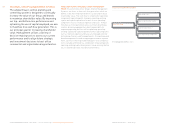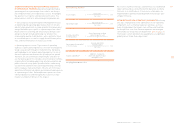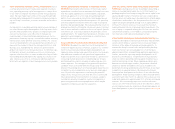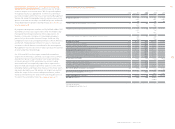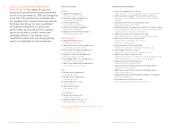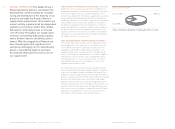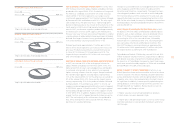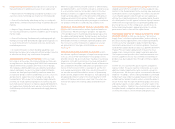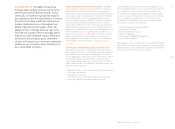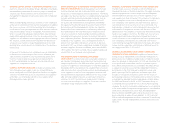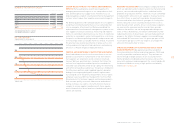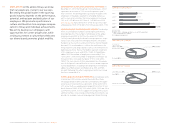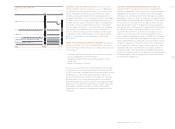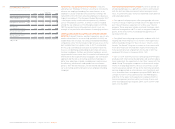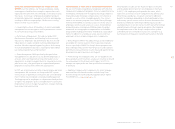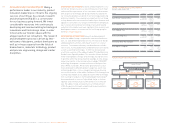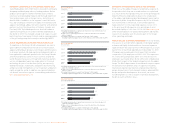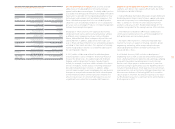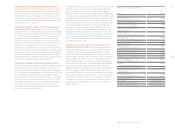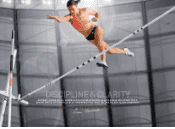Reebok 2007 Annual Report Download - page 70
Download and view the complete annual report
Please find page 70 of the 2007 Reebok annual report below. You can navigate through the pages in the report by either clicking on the pages listed below, or by using the keyword search tool below to find specific information within the annual report.066
ANNUAL REPORT 2007 --- adidas Group GROUP MANAGEMENT REPORT – OUR GROUP -- Corporate Functions - Sustainability
WARNING-LETTER SYSTEM TO ENFORCE STANDARDS In the
event of a violation of the adidas Group’s Workplace Standards,
we immediately undertake all necessary steps to remedy the
situation. Our internal monitors work closely with factory
manage ment to develop concrete action plans with reme diation
deadlines.
When we fi nd ongoing and serious instances of non-compliance
and a lack of commitment from factory management to address
the issues, we issue a fi rst formal warning letter including a
notifi cation to factory management that their business relation-
ship with the adidas Group is in jeop ardy. A second warning
letter is issued when adequate improvements have not been
made within agreed timelines. After the second warning, if the
supplier has still failed to initiate appropriate action to remedy
the situation, a third and fi nal warning letter will be sent. On
any given issue, failure to respond appropriately to the third
warning letter usually results in a termination of the business
relationship.
In the event of continuous non-compliance, we see termination
of the business relationship as a last resort. Whenever pos-
sible, however, we prefer to stay in partnership and to work
from the inside to help encourage factory improvements.
In 2007, we terminated our business relationship with four
suppliers for compliance reasons.
CAREFUL SUPPLIER SELECTION To improve working condi-
tions throughout our supply chain, our Group SEA team
works closely with the Global Operations function on supplier
selection. The SEA team assesses all potential new suppliers
and orders can only be placed with a new supplier when
SEA approval has been granted.
ENCOURAGING SELF-GOVERNANCE THROUGH MANAGE-
MENT SYSTEM SUPPORT Good management systems help
factories improve their day-to-day operations and support
the process of internalization and self-governance. Therefore,
we support our business partners in establishing management
systems with internationally recognized standards such as
ISO (International Standardization Organization) 14001
for quality and environmental management and OHSAS
(Occupational Health and Safety Assessment Series) 18001.
By running a certifi ed management system, our suppliers
demonstrate their commitment to continuously enhancing
their performance. We help them build or improve human
resources systems to maintain proper working conditions,
including factory grievance systems to routinely fi nd and fi x
non-compliance problems. Further, by enforcing employment
standards at our suppliers’ sites, we empower workers to
protect their own rights and take an active role in decision-
making. In 2007, our Group’s supply base included 22 athletic
footwear suppliers’ factories worldwide, which were OHSAS
18000 and / or ISO 14001 certifi ed. These suppliers produced
around 75 % of our footwear sourcing volume.
TAILORED TRAINING TO ACHIEVE SUSTAINABLE
COMPLIANCE To achieve long-term sustainable compliance,
we consider training even more important than monitoring
and policing factories. Our SEA team offers specifi c training
courses for supervisors and managers to help them apply our
Standards. Further, we promote the establishment of sustain-
able structures that actively involve workers and management
of our suppliers as well as local employee associations and
non-governmental organizations (NGOs). In this way, accept-
able working conditions become a routine part of business
activities. In 2007, the SEA team conducted 267 training
sessions and workshops for suppliers, licensees, workers
and adidas Group employees (2006: 173).
INTERNAL MONITORING THROUGH FACTORY INSPECTIONS
The SEA team assesses compliance with the Workplace
Standards by means of factory inspections. We apply innovative
monitoring approaches such as deeper and more frequent
monitoring than in previous years of fewer suppliers in our
core supply chain than in the past. This allows us to rigorously
assess compliance risks and to identify the root causes of
non-compliance. Our auditors check performance against a
customized risk list for each factory that is monitored. The
methodology is linked to a fac tory rating which measures the
effectiveness of compliance systems and the work of their
administrators. This enables us to precisely determine training
needs at our suppliers’ fac tories. The SEA team also acts as a
change agent, advising our manufacturing partners how to
correct instances of non-compliance and how to prevent future
non-compliance. During 2007, we conducted 1,007 factory
visits involving management and worker interviews, document
review, facility inspections and trainings at different levels in
our supply chain (2006: 1,101 visits).
EXTERNAL INDEPENDENT ASSESSMENT UNDERLINES
CREDIBILITY OF SEA PROGRAM In addition to internal moni-
toring, we value independent assessment by third parties to
demonstrate the credibility of and provide verifi ed information
about our program to stakeholders. In 1999, we joined the FLA,
a non-profi t multi-stakeholder coalition of private corpora-
tions, NGOs and universities. As a member, the adidas Group
is subject to external assessment by independent monitors,
participation in the FLA third-party complaint system and
public reporting. The FLA publishes an annual report that
includes a transparent evaluation system for the results of
participating companies. Following extensive reviews, the FLA
accredited the individual monitoring programs of both adidas
(in 2005) and Reebok (in 2004). In 2007, the adidas Group as
a combined entity assumed the role as the FLA participating
company. The next FLA evaluation and program re-accreditation
of the entire adidas Group monitoring program is scheduled for
2008. Since joining the FLA, more than 200 Independent
External Monitoring (IEM) audits and verifi cation visits have
been conducted at adidas Group suppliers. In 2007, external
FLA-accredited independent monitors conducted 12 moni toring
audits (2006: 35) and 3 independent external verifi cation visits
(2006: 8).


